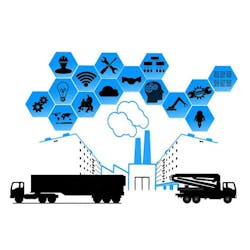Industrial Internet of Things shows its strength in numbers
By 2022, there will be 7 billion Internet-connected wireless sensing, tracking and control devices using technology such as Bluetooth Low Energy (BLE), according to a study from ON World, a research firm concentrating on the Internet of Things (IoT). As wireless sensor networks (WSNs) integrate with cloud services, the majority of these devices will use a short-range radio, but low-power wide area network (LPWAN) technologies will increase 2.5 times faster.
Already dominant in the wearables market, BLE is growing even faster for WSN applications such as industrial sensors, and the opportunities will grow even faster with the completion of Bluetooth mesh in July, according to the report.
LPWAN technologies have energized the Internet of Things with battery lives of more than five years for wireless sensors that communicate over many miles. LPWAN primarily targets different applications than short-range WSNs, but these are competitive, especially in markets such as smart cities, metering, asset tracking, buildings and industrial automation. Combining LPWANs with short-range wireless technologies, such as BLE or Wi-Fi, is a growing trend. The benefits include seamless application connectivity and increased localization accuracy, as well as remote firmware over-the-air updates.
“Plummeting chipset prices, multi-protocol radios and free cloud infrastructure offerings will ensure more IoT devices are connected to the Internet than users within the next two years,” says Mareca Hatler, ON World’s research director. “This has accelerated IoT adoption as the network incompatibility argument fades away and applications become the primary differentiator.”
This is good news for the Industrial Internet of Things (IIoT). In mid-September, I attended the third annual Smart Industry conference in Chicago. It was a networking wonderland, harboring a spectacular array of technologies and applications.
What I found most noticeable was the way the event mirrored the IIoT in their evolutions. Gone are the days of lofty visions and thoughtful aspirations for this mythical machine connectivity. It is happening. And it’s happening in a variety of applications too numerous to fathom. From Kaeser Compressors’ ability to sell productivity instead of capital equipment to Pioneer Energy’s use of remote connectivity for real-time control of process skids. From GKN Driveline’s replacement of multiple tracking systems with RedViking’s Argonaut platform for traceability to Rexnord’s product portal, designed to reduce downtime caused by bearing failure in the gearbox. Wave after wave of applications continues to advance, each one more innovative and unique than the previous one. The opportunities seem limitless. And standing idly by won’t end well.
“We used to be like a typerwriter manufacturer,” explains Tom Bucklar, director of IoT and channel solutions at Caterpillar, one of the keynote speakers at Smart Industry. “Today, we’re like a PC manufacturer. Almost every machine that comes out of our factory has data streaming from it. There are 560,000 connected assets that we can leverage.”
That’s a lot of assets, which translates into a lot of opportunities for new applications.
ALSO READ: Case study: Hits and misses in an actual IIoT implementation
Mike Bacidore is the editor in chief for Control Design magazine. He is an award-winning columnist, earning a Gold Regional Award and a Silver National Award from the American Society of Business Publication Editors. Email him at [email protected].
About the Author
Mike Bacidore
Editor in Chief
Mike Bacidore is chief editor of Control Design and has been an integral part of the Endeavor Business Media editorial team since 2007. Previously, he was editorial director at Hughes Communications and a portfolio manager of the human resources and labor law areas at Wolters Kluwer. Bacidore holds a BA from the University of Illinois and an MBA from Lake Forest Graduate School of Management. He is an award-winning columnist, earning multiple regional and national awards from the American Society of Business Publication Editors. He may be reached at [email protected]



